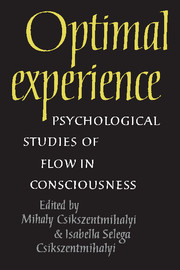Book contents
- Frontmatter
- Contents
- Acknowledgments
- Contributors
- I A THEORETICAL MODEL OF OPTIMAL EXPERIENCE
- II VARIETIES OF THE FLOW EXPERIENCE
- 5 Introduction to Part II
- 6 Bosozoku: flow in Japanese motorcycle gangs
- 7 Women, work, and flow
- 8 The relationship between life satisfaction and flow in elderly Korean immigrants
- 9 Flow and writing
- 10 Flow in solitary ordeals
- III FLOW AS A WAY OF LIFE
- IV THE MEASUREMENT OF FLOW IN EVERYDAY LIFE
- References
- Name index
- Subject index
5 - Introduction to Part II
Published online by Cambridge University Press: 05 June 2012
- Frontmatter
- Contents
- Acknowledgments
- Contributors
- I A THEORETICAL MODEL OF OPTIMAL EXPERIENCE
- II VARIETIES OF THE FLOW EXPERIENCE
- 5 Introduction to Part II
- 6 Bosozoku: flow in Japanese motorcycle gangs
- 7 Women, work, and flow
- 8 The relationship between life satisfaction and flow in elderly Korean immigrants
- 9 Flow and writing
- 10 Flow in solitary ordeals
- III FLOW AS A WAY OF LIFE
- IV THE MEASUREMENT OF FLOW IN EVERYDAY LIFE
- References
- Name index
- Subject index
Summary
Flow can happen anywhere, at any time, provided that the person's capacities and the opportunities for action in the environment are well matched. This optimal interaction is most typical of conditions when people voluntarily become involved in activities designed to be enjoyable, such as sports, games, spectacles, and artistic or religious performances. But one of the contributions of the flow concept has been to remind us that activity and experience are ultimately independent of each other. The most lavish entertainment can be boring, and the most routine job enjoyable. It is impossible to explain the quality of the experience by reference to the objective conditions of the environment, or by reference to the person alone; only the interaction between the two yields the answer.
The practical consequence of this perspective is to open up the possibility of improving the quality of experience in situations that previously were seen to be naturally boring or stressful, such as work or study. If it is true that in principle any activity can be made enjoyable, there is no excuse for resigning oneself to a boring life.
The chapters that follow show the enormous variety of conditions that can produce flow, from the ritual swarming of Japanese motorcycle gangs to the solitary ordeals of polar explorers. In each case, however, the experience becomes enjoyable only when personal skills and the challenges of the situation are in harmony, and when the other conditions of the flow experience – concentrated attention, clear goals, feedback, lack of distractions, and so on – are made possible.
- Type
- Chapter
- Information
- Optimal ExperiencePsychological Studies of Flow in Consciousness, pp. 85 - 91Publisher: Cambridge University PressPrint publication year: 1988

